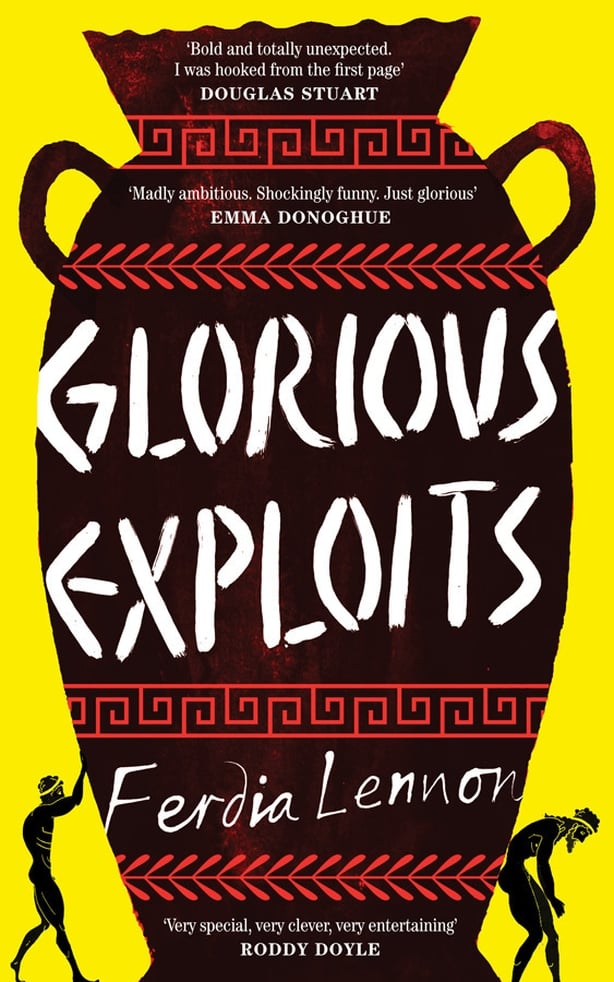Crack open any page of Ferdia Lennon's debut novel and you’d be hard-pressed to guess it takes place in Ancient Sicily some two and a half thousand years ago.
A classics graduate, this modern epic is seven years in the making, and thrums with a distinctly Dublin wit. Its true triumph, however, is in balancing the comedy and tragedy in this tale of friendship, manhood and art.
Set in Syracuse, Sicily in 412BC, it follows two friends – Lampo and Gelon – who decide to stage a production of Euripides, starring imprisoned Athenians captured during the Peloponnesian War. It’s not entirely fabricated either, with accounts in Plutarch mentioning Athenian prisoners in Sicily who won food and drink by reciting lines of epic poetry.
They’re a mismatched pair, Lampo talkative and cheeky and Gelon melancholic and earnest about his love of the theatre, and together propel the story forward with their sense of loving exasperation with each other.
We need your consent to load this rte-player contentWe use rte-player to manage extra content that can set cookies on your device and collect data about your activity. Please review their details and accept them to load the content.Manage Preferences
Listen: Glorious Exploits - Ferdia Lennon talks to Culture File
The dialogue has a Martin McDonagh quality to it, darting and playful but grounded in a grit that comes from the contextual horror of the time - this is post-war Sicily, an acrid landscape, with everyone out to capitalise off the back of the war.
It’s also a distinctly Dublin voice, peppered with phrases like "your one" and "made a show of". At one memorable point, Lampo calls Cassandra – the cursed sooth-saying Princess of Troy – a "wreck-the-head", a quip that instantly humanises the lofty figures of mythology.
Whereas the intrusion of an Irish accent in Alexander, the infamous Colin Farrell film, still stings the ear, here Lennon uses it to his advantage, lacing the novel with our own mischievous music in a way that modernises this tale of friendship and art even more.
Ancient references jostle and glint off of more tongue-in-cheek modern ones, like when Lampo goes wild at the market and buys himself a pair of green crocodile boots, which he insists on calling "crocs" for the remainder of the novel.
Later, a mysterious figure, passing a singing beggar, stops and tells him, "Has anyone ever told you to go professional?"
A reverence for art ripples throughout the novel, heightened by the characters’ desperation in the aftermath of the war. Although Athens remains Sicily’s enemy, the force that robbed them of brothers and fathers and friends, it’s also the seat of high culture.
For this reason Gelon is intent on producing the play for the sake of art, for if Athens falls, as it is then believed it will, what happens then? "See, we can’t let them disappear", he tells Lampo.
Lennon gently explores how art can be a unifying force, such as when Gelon makes a speech to the prisoners about how he came to love the theatre. Speaking of his loneliness as a child, and how it was soothed by the words of Greek poets, he says, "I don’t hate you. How could I?"
It’s a timely reminder of not only the value of art and culture and the dangers of destroying it, but also how opposing sides can unite in appreciation of it. Such a weighty statement could easily derail a story, but Lennon offers it up simply without opining or turning his brilliantly realised world into just a vessel for political statements. For this reason, it’s all the more impactful.
For all the buoyant humour of the novel, it also examines the pain of grief. Amidst this deep appreciation for fraternity is a cry for fatherhood. When a gang of young boys join the theatre troupe, familiar dynamics start to kick in.
Gelon, whose son died early on, rediscovers a softness in himself as he befriends one of them. Soon, Lampo observes, the entire troupe of Athenian prisoners are "performing fatherhood" for the boys.
Much like 300,000 Kisses, Sean Hewitt’s collection of forgotten tales from the Ancient world, Lennon revitalises an ancient world, coating familiar tropes and motifs in a fresh lick of paint. By using humour and our own way with words, Lennon succeeds in helping us look back anew at where we’ve come from, and seems to subtly gesture a way forward.

Glorious Exploits is published by Penguin


